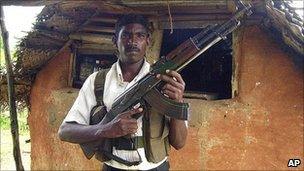Sri Lankan war inquiry commission opens amid criticism
- Published

The Tamil Tigers were surrounded and eventually defeated by government forces
A commission set up to examine the last years of Sri Lanka's civil war has held its first sitting amid international claims that it lacks credibility.
Human rights groups say government troops as well as the defeated Tamil Tiger rebels may have committed war crimes before the war ended last year.
But they believe the panel, appointed by the Sri Lankan government, will fail to fully investigate their accusations.
Sri Lankan officials have dismissed calls for an international inquiry.
The UN's secretary-general has appointed a special panel to advise on the need for a separate UN inquiry.
'Government interference'
Earlier, 57 members of the US Congress wrote to Secretary of State Hillary Clinton urging her to push for an independent enquiry.
They say the Commission on Lessons Learned and Reconciliation will not be independent enough to properly examine the allegations of war crimes, and has been given too limited a remit.
The panel has been set up primarily to examine the reason a truce between the government and the Liberation Tigers of Tamil Eelam (LTTE) broke down in 2002, and it is less likely to look into allegations of war crimes, says the BBC's Charles Haviland in Colombo.
The International Crisis Group alleges that the military may have killed tens of thousands of Tamil civilians during its final offensive against the Tamil Tigers.
The US Senators and Congressmen say Sri Lanka's reconciliation commission "has much too narrow a scope and no mandate to hold those investigated accountable for their actions".
"We urge you to call for a robust and independent international investigation that would finally clarify the events that occurred during the conflict and provide the foundation for a sustainable peace in Sri Lanka," they told Mrs Clinton.
Their letter said other probes launched by the Sri Lankan government had "delayed criminal investigations".
In several instances, members of commissions had resigned in protest at the government's interference, it added.
The Sri Lankan government, dominated by the country's Sinhalese majority, has rubbished such claims and said the commission will bear witness to the facts.
It has also criticised foreign suggestions that an international inquiry on the war is needed.
The government says that its commission is inspired by South Africa's Truth and Reconciliation Commission.